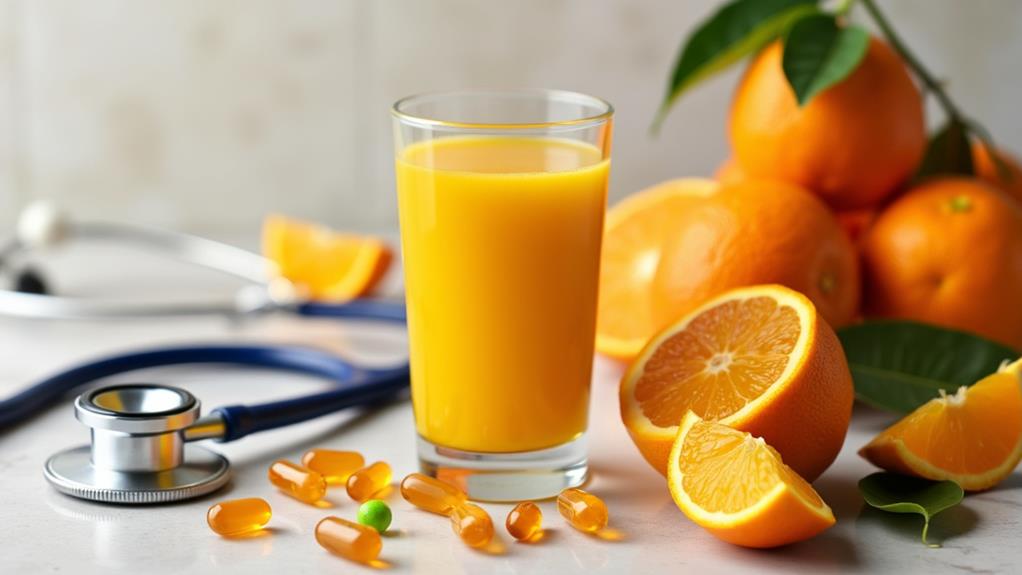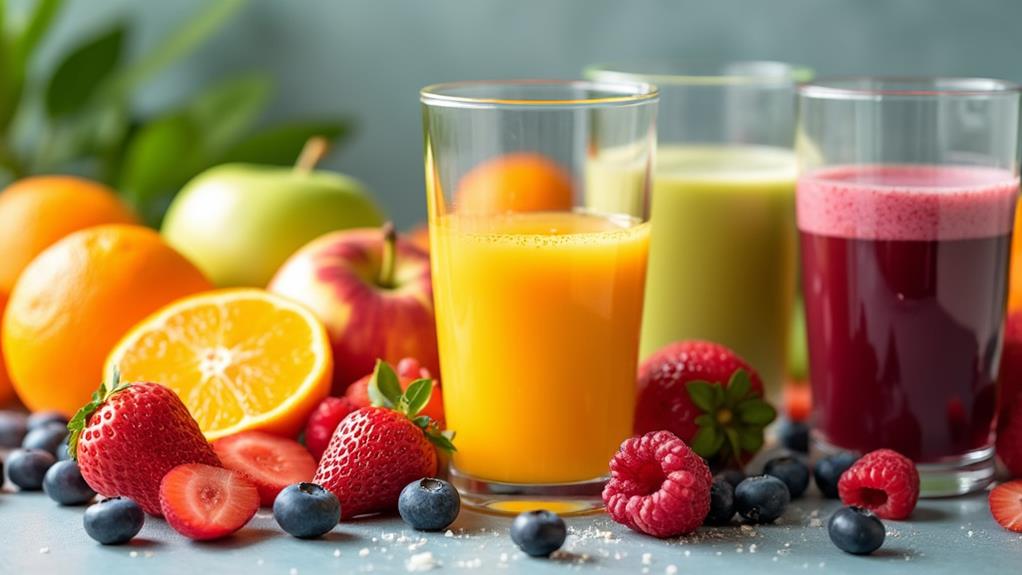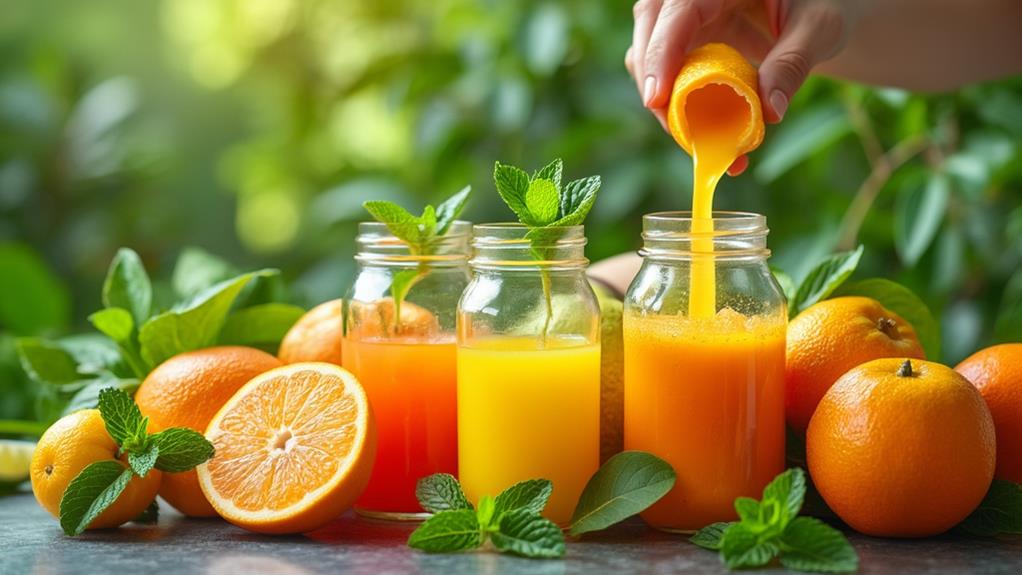Vegetable Juice vs. Whole Vegetables: Which Is Healthier?
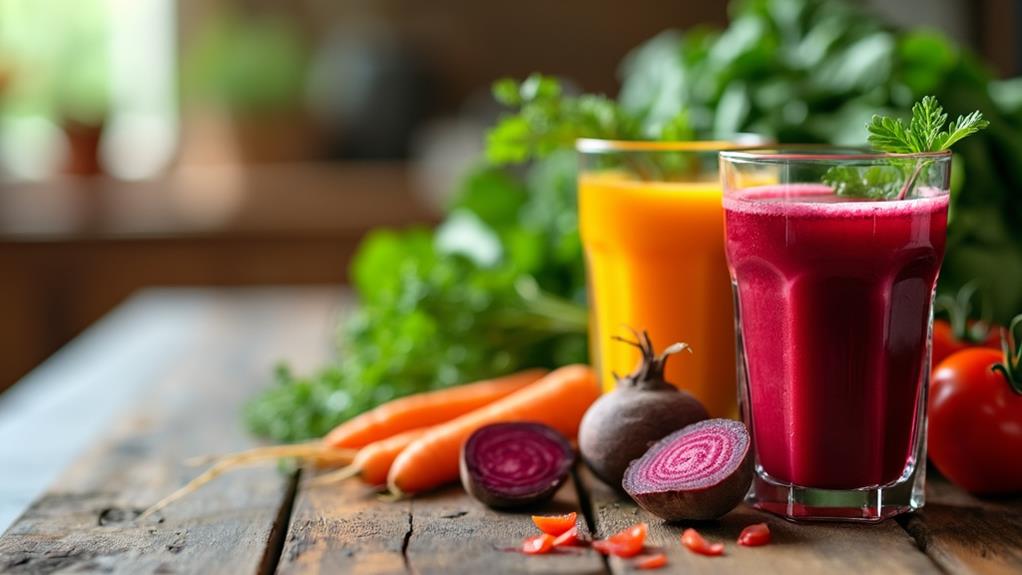
When deciding between vegetable juice and whole vegetables, go for whole vegetables. They're packed with dietary fiber, essential for digestion, weight management, and maintaining stable blood sugar levels. Whole vegetables help you feel fuller longer, making it easier to control hunger and calories. On the other hand, juices lack fiber, often have more sugar, and can lead to blood sugar spikes. While juicing can offer concentrated vitamins for those with digestion issues, relying solely on juice may result in nutritional gaps. Opt for a balanced approach to enjoy all the health perks—there's more to uncover about how to improve your diet.
Benefits of Whole Vegetables
Although vegetable juice offers convenience, whole vegetables provide unmatched benefits that are fundamental for maintaining good health. When you incorporate whole vegetables into your diet, you're not just consuming food; you're harnessing the power of dietary fiber. This fiber is indispensable for digestion and plays a significant role in weight management by promoting satiety and fullness, which helps you avoid overeating.
Whole vegetables also offer a time-released effect on your blood sugar levels, preventing the spikes often associated with juice due to its higher sugar concentration. This makes them an excellent choice for maintaining stable energy throughout the day. Additionally, they are packed with critical vitamins and minerals like vitamin A, C, K, and potassium. These nutrients support your immune function, improve skin health, and are important for comprehensive bodily functions.
In terms of disease prevention, the natural antioxidants and phytochemicals found in whole vegetables are your allies. They help reduce the risk of cancers and improve cardiovascular health, offering you a defense against many chronic diseases. By choosing whole vegetables, you're making a choice that supports a healthier, more balanced lifestyle.
Nutrient Loss in Juicing
While whole vegetables deliver numerous health benefits, juicing can diminish some of these advantages. When you juice vegetables, you're removing the indigestible fiber that plays a vital role in digestive health and maintaining feelings of fullness. This fiber, found in the skin and pulp of whole vegetables, contributes considerably to your complete nutrient intake. When you opt for juicing, you risk losing these fundamental nutrients, leading to nutrient loss.
Additionally, the absence of fiber in juices means your digestive system might not absorb nutrients as efficiently as it does with whole vegetables. The presence of fiber aids the digestive process, allowing your body to extract vitamins and minerals effectively. Without it, you might not be getting the full nutritional benefits that whole vegetables provide.
Juicing also tends to increase the high sugar content of your beverage, especially if you include fruits. This can spike your blood sugar levels, posing a risk of developing diabetes over time. Plus, juices can mask the natural feeling of fullness that whole vegetables offer, potentially leading to overconsumption of calories and carbohydrates. Consider these factors when choosing between juicing and consuming whole vegetables.
Juicing and Fiber Content
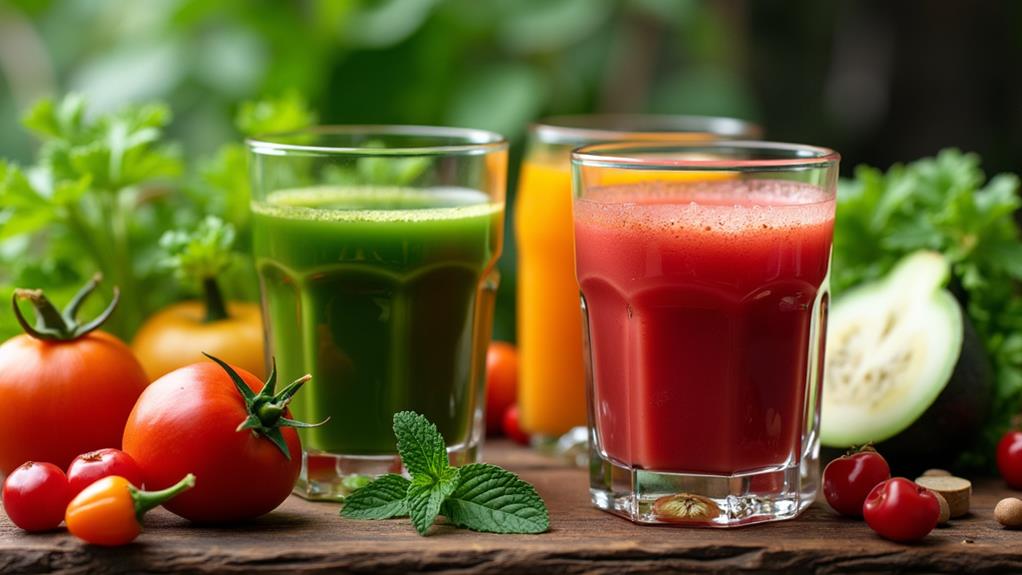
Juicing vegetables strips away their invaluable fiber content, a vital component for maintaining ideal digestive health. While juicing provides a concentrated source of vitamins and minerals, it doesn't offer the fiber benefits you get from whole vegetables. Fiber is fundamental for regulating digestion, promoting gut health, and preventing constipation. When you consume whole vegetables, you retain all their nutrients, including fiber, which contributes to lower cholesterol levels and improved heart health.
Without fiber, juices can lead to rapid spikes in blood sugar levels. This is because fiber helps slow down the absorption of sugar into your bloodstream, providing a more stable energy release. The absence of this significant nutrient in juice could potentially increase your risk of weight gain and even type 2 diabetes over time. Whole vegetables, on the other hand, help maintain fullness, reducing the temptation to overeat and aiding in weight management.
Impact on Blood Sugar
When you consume vegetable juice, you might experience rapid spikes in blood sugar levels due to the high concentration of natural sugars, especially if the juice includes fruits. Unlike whole vegetables, which are packed with healthy fiber, fruit juice lacks this crucial component. Fiber slows digestion and guarantees a gradual release of sugars into the bloodstream. Here's how whole vegetables can help you maintain stable blood sugar levels:
- Fiber Content: Whole vegetables are rich in fiber, promoting slower digestion and a steady release of sugar, which helps prevent spikes in blood sugar.
- Insulin Sensitivity: Eating whole vegetables can improve insulin sensitivity, reducing the risk of type 2 diabetes.
- Satiety: The fiber in whole vegetables increases feelings of fullness, decreasing hunger and cravings that might lead to overeating.
- Balanced Sugars: Juicing advocates often forget that limiting fruit in juices minimizes sugar intake, consequently stabilizing blood sugar levels.
Juicing for Nutrient Intake
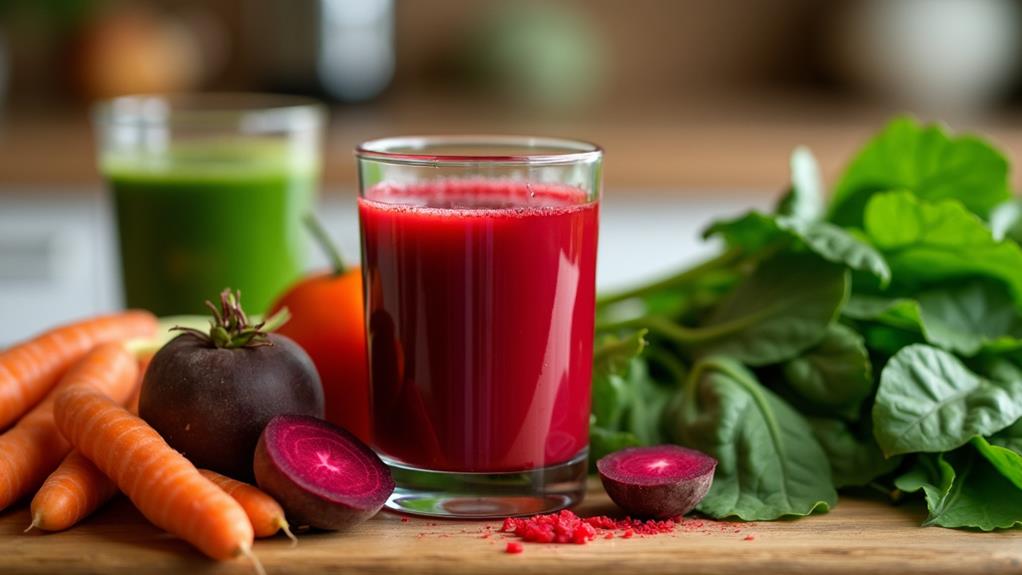
Among the many ways to improve your nutrient intake, juicing stands out as an efficient method to get a concentrated source of vitamins and minerals. By extracting juice from whole vegetables, you gain easy access to nutrients, especially beneficial if you face digestion issues or malabsorption. Juices are rich in antioxidants and vitamins A, C, and K, which enhance your immune function and improve skin health. When you juice primarily vegetables, you'll keep sugar content low, maximizing health benefits without spiking your blood sugar.
However, there's a trade-off when you choose juicing over whole vegetables. While juices provide a nutrient increase, they lack the fiber found in whole vegetables. Fiber plays a vital role in digestion, helping to maintain gut health and lower cholesterol levels. It also contributes to a feeling of fullness, making it easier to manage your appetite.
Still, incorporating vegetable juices into your diet can lead to positive health outcomes. Regular consumption is linked to reduced risks of chronic diseases like Alzheimer's and improved hydration. To strike a balance, consider blending vegetable juices with small amounts of fruit to enjoy the health benefits without overloading on sugar.
Whole Foods and Satiety
Engage yourself in the world of whole foods, and you'll uncover a crucial ally in dietary fiber, which plays a critical role in promoting satiety and assisting digestion. Whole vegetables are rich in this fundamental nutrient, helping you feel full longer and supporting your digestive health. By regulating appetite and preventing overeating, fiber aids in effective weight management. When you consume whole vegetables, the gradual release of sugars into your bloodstream helps avoid the spikes that come with juices, maintaining steady energy levels.
Consider the benefits of whole vegetables:
- Satiety and Weight Management: Fiber's ability to keep you feeling full can contribute to better weight management and lower calorie intake.
- Digestive Health: Whole vegetables take longer to chew and digest, enhancing your eating experience and promoting prolonged feelings of fullness.
- Heart Disease Prevention: A diet high in whole vegetables has been linked to lower rates of heart disease, showcasing fiber's long-term health benefits.
- Metabolic Health: The gradual digestion of whole vegetables supports metabolic health by reducing rapid blood sugar spikes.
Opting for whole vegetables over juices can lead to lasting health benefits, highlighting the significance of fiber in your diet.
Caloric Intake Considerations
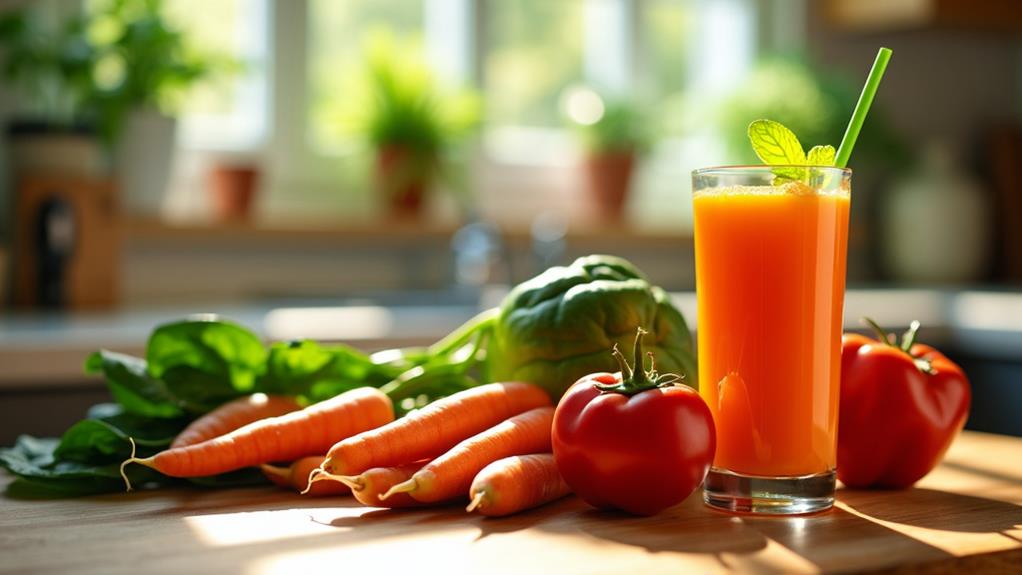
Juice consumption can markedly impact your caloric intake due to the concentrated natural sugars present in fruits, which may lead to unexpected blood sugar spikes and potential weight gain. When drinking juices, it's easy to underestimate caloric content because they lack the fiber found in whole vegetables. Fiber plays an essential role in satiety, helping you feel fuller for longer and naturally regulating caloric intake. Without it, you might experience quick energy surges, prompting you to consume more calories to satisfy hunger.
Whole vegetables, on the other hand, are packed with fiber, promoting a gradual release of energy and aiding in better weight management. By providing a lasting feeling of fullness, they help you listen to your body's hunger cues more accurately, reducing the risk of overconsumption. Research shows that people often misjudge portion sizes when drinking juices, leading to unintentional calorie overload.
Smoothies, which retain the fiber from fruits and vegetables, offer a balanced alternative to juices. They support weight management by maintaining steady energy levels. Ultimately, focusing on whole vegetables and fiber-rich options can help you make more informed choices about your caloric intake and general health.
Health Risks of Juicing
Consider the potential health risks when incorporating juicing into your daily routine. While juicing might seem like a convenient way to enhance your nutrient intake, it's important to be aware of its drawbacks compared to consuming whole vegetables. Here are some risks associated with juicing:
- Excessive Calorie Consumption: Juices, especially those high in fruit, can lead to excessive calorie and sugar intake. This can spike blood sugar levels, increasing the risk of diabetes and other health problems.
- Lack of Fiber: Juicing removes fiber, which is significant for maintaining regular bowel movements and a feeling of fullness. Without fiber, you may experience digestive issues and struggle to keep a healthy weight.
- Nutritional Deficiencies: By relying heavily on juices, you might miss out on the full range of vitamins, minerals, and phytonutrients present in whole vegetables. This can lead to nutritional deficiencies over time.
- Increased Cardiovascular Issues: High sugar levels and inadequate fiber intake, often linked to regular juice consumption, can raise the risk of cardiovascular issues. Balancing juices with whole foods is important to avoid these negative health effects.
Balancing juicing with whole vegetables can be healthier, providing necessary fibers and nutrients.
Safety in Juice Preparation

Guaranteeing the safety of your juice starts with proper preparation techniques. Begin by thoroughly cleaning your fruits and vegetables to remove potential contaminants. This step is vital in preventing contamination that could arise from dirt or pesticide residues. Choosing organic produce, especially from the Dirty Dozen list, can further minimize pesticide exposure, enhancing your juice's safety.
When it comes to juicing techniques, opting for cold-press methods is beneficial. Cold-press juicers maintain more nutrients and produce less heat, preserving the quality of your juice. Remember, the fresher the juice, the safer it is. Consuming it immediately after preparation reduces the risk of harmful bacterial growth. Homemade juices are best enjoyed right away and should not be stored for long periods due to their short shelf life.
Don't overlook the importance of cleaning your juicing equipment thoroughly after each use. Residual juice can harbor bacteria, leading to contamination if not properly cleaned. By preparing only as much juice as you can consume at once, you guarantee you're drinking fresh, safe juice every time. These steps can help you enjoy your homemade vegetable juice while keeping health risks at bay.
Dietary Recommendations
Many dietary guidelines underscore the value of whole fruits and vegetables, primarily for their fiber content, which supports digestion, satiety, and general health. The American Heart Association advises consuming at least 4-5 servings of both fruits and vegetables daily to mitigate the risk of chronic diseases. Whole vegetables, in particular, retain vital nutrients better than their juiced counterparts, making them fundamental for a balanced diet. They help maintain healthy cholesterol levels and reduce the risk of heart disease due to their fiber and nutrient-rich profile.
When considering how to incorporate vegetables into your diet, remember these key points:
- Whole Vegetables: Prioritize them over juices to guarantee you get the full spectrum of nutrients, especially fiber.
- Dietary Guidelines: Follow them to verify you're meeting your daily nutrient requirements and reducing chronic disease risk.
- Balanced Diet: Use juicing as a supplement, not a replacement for whole foods, to maintain a balanced intake of proteins, fats, and fibers.
- Juice Choices: Opt for vegetable juices over fruit juices to minimize sugar intake and support a balanced nutrient profile.


